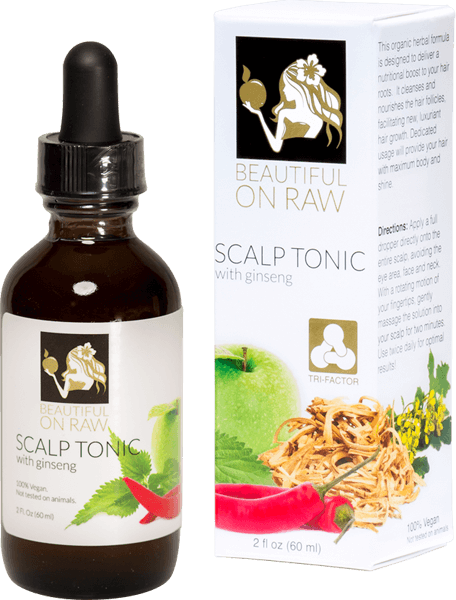A Natural Alternative To Hair Dye

One of my favorite things about the raw food diet … It starts out a diet and ends up a lifestyle.
You never stop evolving, improving, and perfecting. It starts with food choices and moves up and up the scale until every aspect of your life is turned around. One step at a time, as you are ready, you make improvements that result in an astounding transformation.
Part of my mission, my passion, is to introduce people to all-natural, effective beauty products, practices and devices which will assist with this process, yet never compromising health for the sake of beauty--ever!
That includes keeping your hair healthy, thick, lustrous and beautiful. You may know that I have recently released a natural hair tonic. But what about hair coloring? It is no secret that conventional hair color is extremely toxic. You simply cannot apply harsh and sometimes carcinogenic chemicals to the specialized skin of the scalp, which contains an extraordinary number of capillaries, and expect it not to be absorbed directly into the bloodstream. Aside from the cancer concern, these chemicals will also weaken the hair shaft and make it porous, stripping the original color even further.
Several companies offer much more natural, plant-based, healthy alternatives for keeping your hair the color you love. A few of them that I am familiar with: NaturTint... EcoColors... and Aubrey Organics Color Me Natural. Many health food stores carry these or similar brands as consumers are becoming more informed and the demand increases.
But there is one coloring alternative that you may never have heard of, a colorant not only completely plant based, non-toxic and natural, but one used safely and effectively for centuries by beautiful women all over the world. It is henna, one of the most popular beauty secrets of Asian, African and Middle Eastern women.
Henna (lawsonia inermis) is an ancient plant that historians believe has been used for thousands of years both cosmetically and medicinally. It grows in hot regions, such as Middle East and India. The leaves as well as the twigs and flowers of the plant are ground into a powder that forms a paste when mixed with hot water and is used for hair dye as well as body art. The henna plant produces a certain burgundy-hued dye molecule known as lawsone, which bonds with protein, making it quite suitable for dying skin, hair, and nails.
Original henna only imparts a reddish tint to the hair, mixing subtly with a person's own hair color to produce striking results. You can obtain different shades by mixing with different liquids such as herb teas, lemon, coffee or other plants such as indigo. Indeed, you can get just about any color result besides not mere red.
Henna, however, does not lighten the hair.
Look for pure mixtures of lawsonia plus one or two other plants and nothing else. You do not want anything with PPD in it, as this is a very toxic ingredient used in many darkening hair dyes.
One thing that makes henna popular is that it conditions, cleanses and cools the scalp. It strengthens the hair, helps reduce dandruff, and offers anti-fungal properties. It helps make hair more manageable and gives it a healthy sheen.
The conditioning benefits and subtle natural coloring of henna are particularly alluring, yet I would be remiss if I didn't mention that there are a few things to consider before using it. Henna can, quite frankly, be messy. Remember your childhood days, making mudpies and baking them in the sun? If you enjoyed that activity, then henna may be just right for you. As opposed to the ease of simply mixing two bottles of chemicals together and squirting away, henna takes a little more attention and effort, but the results are certainly worth it!
Mixed with warm liquids such as water or herb teas, henna has the consistency of mud. It is applied as a paste to the entire head starting with the roots and then working all the way to the ends, saturating all the hair thoroughly. It also has a mild earthy odor which is not at all unpleasant, but does linger. You may notice it for a few shampooings afterwards.
Henna needs to be kept warm to work its magic, so you will need to have a shower cap and hair dryer nearby to apply heat. Rinsing thoroughly is important. If you are switching from conventional dyes or have noticeably gray hair, you will need to pay particular attention to the instructions for first time users to ensure you get the results that you want.
Coloring with henna is also more agreeable as your hair grows out, because it fades away more gradually and evenly, without the sudden appearance of the familiar 'white stripe' down the middle of the head.
After a couple of applications, you will be perfectly comfortable and familiar with the process and will no doubt begin to look forward to your all-natural beauty treatment, especially since you know that you are not compromising your health in the process.
There is a free e-book available at the following link for everything you could ever hope to know about using this amazing plant-based product for your hair, courtesy of www.hennaforhair.com.
Free Henna E-book (The PDF file takes a little while to load)
The raw food diet will make you feel so young, and henna, once you're accustomed, is enjoyable and comfortable. Maybe your mudpie days aren't over after all!

